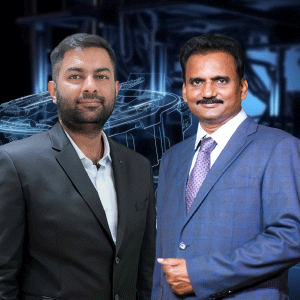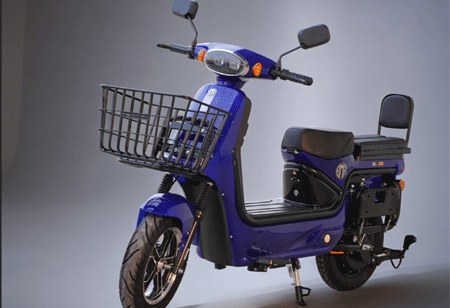
The electric vehicle manufacturing industry is undergoing a transformative surge, propelled by environmental consciousness, technological leaps, regulatory backing, and substantial investment. Despite hurdles like high capital requirements and competition from established automakers, startups are driving the sector forward. Key trends include battery advancements, autonomous integration, sustainable practices, and global expansion, reshaping transportation toward a sustainable, electric future. BMR EV Industries, based in Chittoor, Andhra Pradesh is a pioneering force in this movement, producing 2-wheeler Electric Scooters for passenger commuting and cargo, aspiring to lead India's eco-friendly EV revolution with advanced, high-performing, and zero-emission vehicles.
Innovation & Collaboration
BMR EV Industries has tackled several major challenges in the EV industry through innovative and localized solutions. A key issue has been the low levels of indigenization, as many companies import vehicles directly from China, resulting in products that are not well-suited for Indian conditions and poor consumer confidence due to frequent breakdowns and lack of spare parts. “We addressed this by developing our products ground-up, achieving nearly 73 percent localization, ensuring our vehicles are robust and tailored for the Indian market. Supply chain issues, especially for raw materials, chipsets, and batteries, are another major challenge. To mitigate this, we have partnered with IITs for R&D and local startups to strengthen our local supply chain and reduce dependency on imports. Consumer awareness about the benefits of EVs is another concern for the companies. Concerns related to range anxiety, charge time, total cost of ownership, battery safety, these awarenesses in consumers are at a very low level because the technology is relatively new to people and they don’t quite understand the technology", says Divyansh Joshi.
BMR EV Industries conducts extensive training with their 150+ dealers, organizes college campus drives, and invites students to its factory to educate and promote understanding of EV technology. Adding to it, the pace of infrastructure development, particularly in rural areas, is slow. The company also collaborates with local municipalities to set up charging infrastructure and has developed house-compatible chargers that work with standard 16-amp sockets or three-pin plugs, making EV adoption easier without the need for special infrastructure. Through these measures, BMR EV Industries is effectively overcoming industry challenges and driving EV adoption in India, and by this it has become the fastest growing charging infrastructure networks in India.
Addressing safety concerns in the EV industry is crucial, especially with the occurrence of thermal incidents. BMR EV Industries takes comprehensive measures to ensure a safer environment for customers. The company is among the first to implement the AIS 156 amendment for battery safety, and the firm also over-engineered its batteries for enhanced safety. The firm’s batteries feature aggressive depth of discharges and liquid cooling, capable of withstanding up to 95 degrees Celsius, far exceeding typical operating conditions in India. Additionally, BMR EV Industries collaborates closely with vendors to enhance battery durability. Recognizing the importance of safety, the firm also offers free insurance and waterproof, flood-proof warranties for its batteries.
Client Engagement Process
“At BMR EV Industries, our client engagement process is designed to prioritize R&D and customer feedback, ensuring that our products meet specific needs before they are marketed. For B2B clients, such as last-mile delivery companies and corporate fleets, we begin by understanding their specific requirements, including range, price, and use case. Our R&D team then customizes scooters, tailoring everything from battery size to branding, suspension, telematics & electronics. These prototypes are tested extensively to ensure they meet client needs”, says Divyansh Joshi.
For B2C clients, the firm invests heavily in dealer training to ensure they understand diverse customer needs, from farmers to IT professionals. The company’s dealers undergo comprehensive training to address various use cases and recommend the appropriate product, preventing customer dissatisfaction from mismatched recommendations. Additionally, BMR EV Industries uses data from its smart batteries and cloud technologies to continually improve its products based on real-world usage, employing AI and machine learning to push updates and enhancements. This two-pronged approach, combining direct customer feedback with advanced technology, allows it to deliver superior solutions and maintain high customer satisfaction.

Filling Market Gaps
“To ensure a great market fit, our company first concentrated on finding holes in the market before producing products. The ground-breaking development of BMR HL- 200 is to solve the case of reliable, high loading and highly customizable delivery vehicles. We have patents on this product as well and this is our star product. It’s our highest selling scooter and it’s catering really well to the last mile delivery segment, even in villages it’s being loved and farmers can carry all of their equipment as they can ride it across a farming field and do not face any challenges. It has a fast charging ability and it can charge at your home as well as through a lamp post. In cities, it has swappable batteries, so you can swap batteries and this makes the BMR HL- 200 to fit in the market as a product. And we are also working on our next product, which would be the BMR Bliss which has an amazing 300 km range and technologies like Apple CarPlay and Android Auto to appeal to tech-savvy customers.” shares Divyansh Joshi. With a competitive price tag of about INR 65,000, the Raptor is an accessible, easy-to-use scooter for families making the switch to electric vehicles. Finally, fans of analogue-feeling, vintage-style motorcycles with contemporary electric technology are catered to by the BMR Brigadier.
In the journey towards a greener, safer tomorrow, BMR EV Industries is shaping the destination, one innovation at a time
“Having served with the Indian Army for three years before a medical discharge led me to entrepreneurship. After founding two successful legal tech startups and a hotel chain, I transitioned to the EV Last mile delivery sector, leading strategy and planning to scale electric green scooters, pivoting from bicycle rentals to e-two-wheeler rentals, and then to last-mile deliveries during COVID”, shares Divyansh Joshi. Under his leadership, the company grew to a valuation of INR 450 crore with a fleet of 20,000 scooters. This experience inspired them to move into EV manufacturing to address the need for robust products tailored for last-mile delivery companies. He has honed educational background like degrees in Electrical Engineering, and Environmental Physics from Qafqaz University in Moscow/Azerbaijan, and diplomas from the University of New South Wales, he is also an alumni of The Indian Military Academy, Dehradun and a master’s in EV engineering from IIT Delhi.
Accelerated Expansion
As part of the BMR Group of Industries, which operates in multiple countries, BMR EV has experienced rapid and steady growth. Initially expanding in the South, the company now has dealerships across Northern India and aims to have 500 active stores by the end of 2024. The firm has relied on numerous component manufacturers and vendors to deliver its solutions but is now moving towards in-house production. This includes launching a battery manufacturing unit and a charger plant in Andhra Pradesh, enabling comprehensive component-level manufacturing. Additionally, the firm is expanding its product portfolio with two new products launching soon and three more planned for the coming year, providing customers with a wide range of options under one roof.
We use cookies to ensure you get the best experience on our website. Read more...